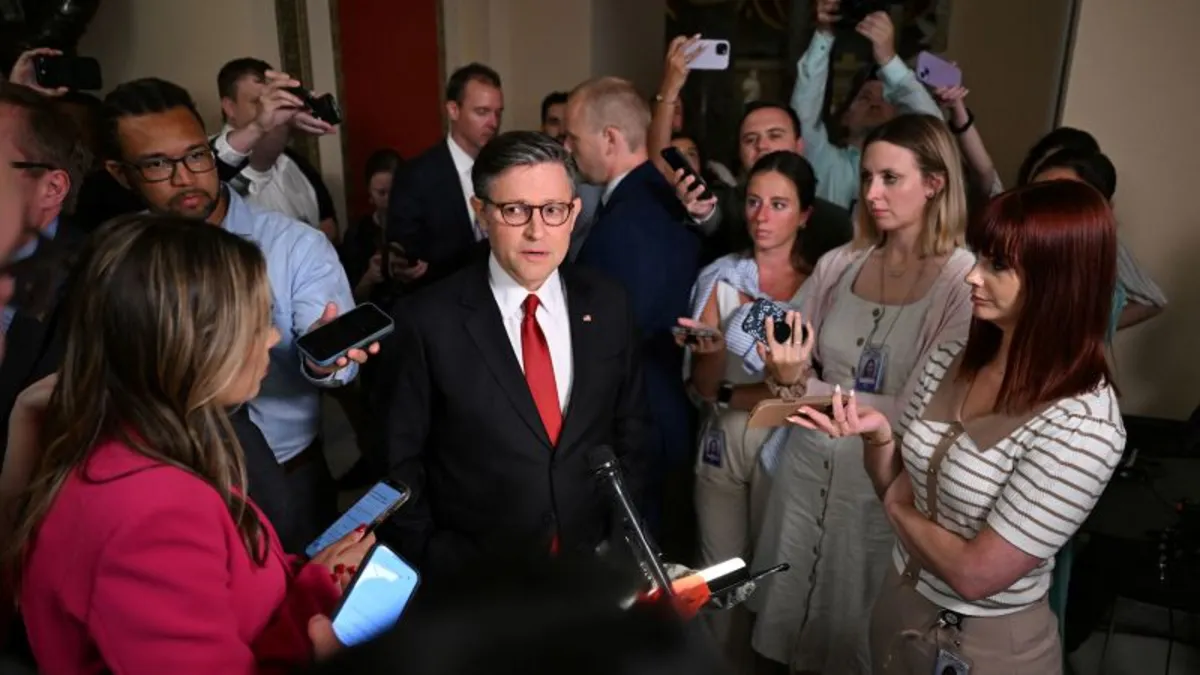
House Republicans are currently embroiled in a dramatic stalemate as President Donald Trump and Speaker Mike Johnson work tirelessly to persuade a group of nearly a dozen holdouts to support the sweeping domestic policy agenda bill. Speaker Johnson has stated that he intends to keep a crucial vote open "as long as it takes," indicating the high stakes involved in this legislative battle.
With the GOP leadership engaged in a furious last-minute effort to rally support for the procedural vote, the outcome of this decision could have significant implications. If they succeed, the House would quickly move towards final passage of the bill after a debate. However, a failure would mark a major setback for Republicans, necessitating a return to the drawing board to formulate a new strategy.
A number of House Republicans are currently obstructing the path to what would be Trump's first major legislative victory of his second term. For weeks, Trump and his team have assured congressional Republican leaders that they would rally the hardliners who are still resisting his agenda. As tensions rise, time is of the essence.
Throughout the day, Trump and his aides have engaged in discussions with the GOP holdouts, even summoning groups of Republicans to the White House to address their concerns regarding the Senate-passed version of the bill. Johnson is facing a critical test of his leadership as he attempts to guide his divided conference toward a vote that many members are reluctant to support.
During a meeting with centrist Republicans, Trump's demeanor was described as "cordial," according to one GOP member present. The White House enlisted the help of Dr. Mehmet Oz, head of the agency responsible for Medicaid, to clarify provisions in the Senate GOP bill related to provider taxes and increased funding for rural hospitals. Trump's presence, along with Vice President JD Vance, has been pivotal in persuading members to back the bill.
Rep. Dusty Johnson of South Dakota noted that these meetings were having a significant impact, stating, "Members are moving to yes." House Majority Whip Steve Scalise emphasized the importance of Trump's involvement, asserting, "The president from day one has been our best closer, and he’s going to continue to be through today."
Johnson and Trump are determined to ensure that the bill reaches Trump's desk in time for a signing on the Fourth of July, leaving little room for further negotiations. The House Republicans can only afford to lose three votes if they have full attendance, underscoring the urgency of the situation.
This week is pivotal for defining Trump's second term, as the push to advance his agenda has been marred by weeks of internal GOP conflict. Some Republicans are apprehensive about how the bill may impact the 2026 midterms. However, Trump and his allies believe that passing this bill will solidify his legacy on key issues such as border security and tax policy, including his campaign promises to eliminate taxes on tips and overtime pay while introducing spending constraints for programs like Medicaid and SNAP.
Despite ongoing discussions at the White House, key conservatives continue to demand changes to the Senate bill—a request that both Trump and Johnson are unwilling to accommodate. Texas Republican Rep. Chip Roy, a vocal critic of the bill, stated, "We need more spending restraint," indicating a strong resistance from the House Freedom Caucus, which has outlined numerous concerns regarding the current bill, including perceived inadequacies in energy tax credits and an increase to the deficit.
Another influential member of the Freedom Caucus, Rep. Andy Harris, opted not to attend the meeting with Trump, reaffirming his opposition to the bill. Similarly, Rep. Keith Self of Texas expressed his exclusion from the White House discussions, highlighting the growing discontent within Republican ranks.
Despite these challenges, House GOP leaders remain optimistic about passing the latest version of the bill, although significant political maneuvering will be necessary. Speaker Johnson is navigating the delicate balance between centrist and right-wing factions, and the legislative process has already included dramatic incidents, such as Sen. Thom Tillis’ unexpected announcement that he would not seek reelection after defying Trump.
Before the House can conduct a final passage vote, it must first address the procedural vote known as a vote on the rule—a process that has been delayed due to conservative threats to rebel against it. This procedural hurdle was recently passed by the House Rules Committee after extensive deliberation, although dissent from conservatives persists.
As the deadline approaches, it remains to be seen whether the Republicans can unite to support Trump's domestic policy agenda, or if internal divisions will ultimately thwart their efforts.